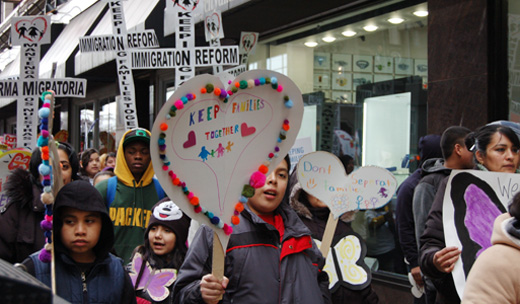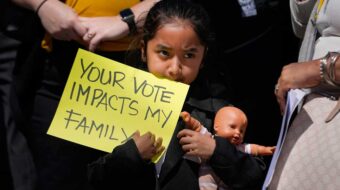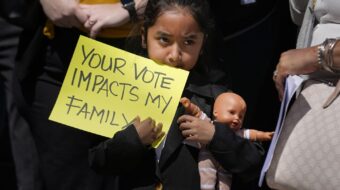
Various proposals for a new comprehensive immigration reform law are being put forward. The high tech industries want more visas for highly educated people. Agribusiness wants more low paid labor. Anti-immigrant groups want to limit the degree to which present day undocumented immigrants can be legalized, and put restrictions on family-based immigration in the future.
The immigrant communities themselves, and their allies in organized labor, the churches, and the African American, Latino, and Asian American communities, are speaking out on what they see as essential: The inclusion under legalization of the largest number of people possible, and, until legislation is passed an implemented, an end to the current fast pace of arrests and deportations, via a moratorium.
Though we must oppose it, it is highly likely that a bill will include a trade-off of legalization of the undocumented for tough repressive measures at the borders and internally.
If such measures pass, and if any considerable portion of the undocumented population is left out of legalization, their situation will be radically worsened for them. Undocumented immigrants who don’t qualify for legalization will become even more vulnerable not only to deportation, but to unscrupulous employers, rapacious landlords, gouging merchants, criminal elements, fake “immigration attorneys,” and other bottom feeders.
To survive, undocumented workers will have to accept even lower pay and even worse working conditions. This is contrary to the interests of all workers in the United States.
Who might end up being left out of a legalization program? In some of the discussions we have heard, especially in the Senate conclave, nobody who is not now employed would qualify: you would have to be working for wages or salary and be able to prove it. That would leave out anybody who has lost his or her job, has been forced to work “under the table” for cash, or whose employers, fearing a fine for having employed undocumented workers, refuse to cooperate with the paperwork needed to prove workers’ employment statuses.
Every day we hear about cases of people falsely accused of crimes who are only exonerated decades later, or of malfeasance by police and prosecutors or negligence by criminal defense attorneys. We cannot be confident that people convicted of crimes in this country are really guilty. The implementation of President Obama’s “Prosecutorial Discretion” initiative has shown how ICE personnel interpret what is and what is not grounds for deportation. In the first place, anybody who has been kicked out or left and has come back is considered a criminal who will not be given a break, even though their return in many cases was for urgent family reasons (e.g. that the family was in dire economic straights because of the absence of the breadwinner, or because of personal or health crises of family members either in the U.S. or the country of origin). People who have used false documents to work will probably be excluded, even though it was impossible for them to pay their taxes unless they took jobs that require such documents. And of course if they cannot prove they paid taxes, they may be in trouble for that.
Finally, people who have been arrested for simple drug possession or for offenses like driving without a license (people who don’t have another way to get to work but who also cannot get a drivers’ license because they are undocumented) may well be excluded. This jeopardizes people who, years ago, decided to plea bargain instead of defending themselves against a criminal charge. Plea bargain or not, the conviction is on their record and will come up when they try to legalize themselves.
Such people will not “self deport;” the problem of undocumented immigrant labor will continue. Full inclusion is essential in any legislation that is passed.
Once someone has been kicked out of the country, even by mistake, they have little or no legal recourse for returning. The fact that they have a spouse and U.S. citizen children in the United States will not be likely to move the U.S. government to let them return legally. The family left behind in the U.S. will likely be destitute. They will default on the mortgage of the house, and will be more likely to need help from public and private charity. This is cruel, and is not in the interests of the people of the United States.
A second issue is what to do until the immigration reform bill is passed. The government has been deporting people at a fast rate. It claims it is focusing on serious criminals, but the statistics show otherwise.
It is morally and ethically indefensible to deport people, with all the trauma and disruption that that involves, who are likely to qualify for legalization once immigration reform legislation is passed. It is especially repugnant to break up families with minor children to do so. It is also expensive, and serves no practical purpose.
Furthermore, the high rate of deportations pressures the immigrants’ rights movement to go along with any old legislation, whether it is in the general public interest or not-anything to stop repression and the fear it causes. The demand for a moratorium on deportations counters this pressure, and, in addition to ethical and humanitarian reasons, this is why all progressive people should support it. This should involve, also, the ending of the Secure Communities and 287 g programs that deputize local law enforcement to do immigration enforcement for which they are ill suited.
Photo: Chicago, children’s march for immigration reform 3/26/13. PW












Comments